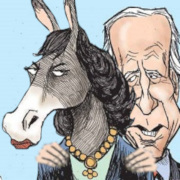|
Pomeroy posted:These do tend to be ideological features of Fascism but I would argue Dimitrov's definition remains the most useful: I agree with Dmitrov but he did not focus on the popular appeal There is a mass movement aspect to fascism that is not the simple finance capital fascism found in neoliberalism why were the farmers in Nazi Germany so enamored with Nazism, much more than the urban workers? There was a core reactionary return to idealized feudalism as found in https://en.wikipedia.org/wiki/Reichserbhofgesetz Why are factory workers more often than not cosndered impure and relegated to foreigners and slaves in both Nazi Germany and Imperial Japan?
|
|
|
|

|
| # ? May 26, 2024 22:03 |
|
i've always liked "suppression of the left amid popular approval" but that's also sort of a i'll-know-it-when-i-see-it thing. the us government already does practically everything a fascist might want their state to do, just mostly without huge masses of the middle class having to join in without being directly employed to do so, so either it's already fascist or it's sucked up all the fascist oxygen depending on how you want to split it
|
|
|
|
Top City Homo posted:I agree with Dmitrov but he did not focus on the popular appeal He does address that point, here for example: Dimitrov posted:What is the source of the influence of fascism over the masses? Fascism is able to attract the masses because it demagogically appeals to their most urgent needs and demands. Fascism not only inflames prejudices that are deeply ingrained in the masses, but also plays on the better sentiments of the masses, on their sense of justice and sometimes even on their revolutionary traditions. Why do the German fascists, those lackeys of the bourgeoisie and mortal enemies of socialism, represent themselves to the masses as "Socialists," and depict their accession to power as a "revolution"? Because they try to exploit the faith in revolution and the urge towards socialism that lives in the hearts of the mass of working people in Germany. but the whole point is that the ideological appeals are malleable, that fascism will try to appeal to interwar German peasants, and to unemployed veterans, and to any other strata that is significant, and that these appeals can totally contradict each other, and we will search in vain through them for an essence of fascism.
|
|
|
|
Dreddout posted:Companies can't legally call plant based milk substitutes "milk" ff thats because people were mixing piss with chalk and powdered coconut and selling it as milk in like 1895
|
|
|
|
Piss was a mistake
|
|
|
|
Samog posted:thats because people were mixing piss with chalk and powdered coconut and selling it as milk in like 1895 that's not good, chalk is non-renewable
|
|
|
|
props to my boy dimitrov for getting a jab in at huey long in that
|
|
|
|
Ferrinus posted:the third team/class in russia was the aristocracy, as you say, but i don't buy that their increased interdependence and organization turned them from the noble/aristocrat class into the "state" class - it's not like pre-capitalist feudal elites were particularly connected to the mode of production except in that they subjected the working class to a barely-disguised protection racket. you're right that by default soviet bureaucrats were too numerous and too tied together to simply toss socialism over their shoulders and get rich, but that i think shows that "underestimating" the bureaucracy wasn't some decisive fuckup on the soviets' part - their administrators were able to defect and loot the country because it had already started to disintegrate from successive regimes of liberalization and other revisionism Sorry for the bad writing, I don’t believe there is a *the* state class in the anarchist style, I sort of jumped from the kropotkinite analysis to a marxist one without clarifying the difference well. The way I see it historically, there have been classes that mainly operate outside the state but try to hold state power to enable their operations, but also classes whose operations only exist through utilizing state power. There is no ”state mode of production” with its own class antagonism, it’s more like there’s a non-state form and state form of the same antagonism and same classes. Feudal lords were little states unto themselves and were forced to utilize serfdom due to their power being structured like a bandit’s. The latifundiary aristocrat on the other hand is the subject of a state, its middle-man landlord. The state designs how they are allocated land and workers and enforces their authority for them. I likened the anarchist implicit state class to any real historical class of the latter type. My tangent about the proposed ”asiatic mode of production” and the subsequent unification of it and feudalism into the concept of tributary mode of production was to illustrate how while feodal lords are a class outside the state that simply utilize one, in developed tributary empires the aristocracy *was* the state. It didn’t have bureaucrats that it utilized, it was the bureaucrats since it integrated bureaucrats rising from other classes into itself. And Russia had developed into that same form where the aristocracy was the state. Their landlord powers came through a collective bureaucratic designed system rather than their individual powers to raise an army. The times of individually capable robbers that had a state based on banding together against competing robbers were over. Private capitalists are analogous to the feudal lords that are individually capable but band together to defend their interests agaist strong enemies, while monopoly and state monopoly capitalists have a completely different relation to the state and tend toward supporting fascistization rather than liberalization.
|
|
|
|
https://twitter.com/PhilGreaves01/status/1264124778673254406?s=20 phil greaves is a joke, but this is an attitude I've seen quite a few UK anti-imperialists embrace. wtf if going on over there
|
|
|
|
Atrocious Joe posted:https://twitter.com/PhilGreaves01/status/1264124778673254406?s=20 I would guess that one part of it is experience telling them that assuming that the British government is being unduly authoritarian and lying to the public is usually not wrong, and the other part is that English people in particular have a tendency to mistake contrarianism for being interesting.
|
|
|
|
the british brain spider strain has gotten more potent in response to the increased relative carbon dioxide concentration indoors due to the quarantine porcedures
|
|
|
|
Atrocious Joe posted:https://twitter.com/PhilGreaves01/status/1264124778673254406?s=20 I think there’s just something in the water across the pond, we did inherit all the worst traits from our imperial parents after all
|
|
|
|
My history teacher said that the majority of the people we sent over to the US in colony days were the rural inbreds it was too difficult to meaningfully employ. To this day I'm still not sure if he was just joking or not. The humanist in me says he was being mean, but then I read reports about what happens in red states.
|
|
|
|
Tesseraction posted:My history teacher said that the majority of the people we sent over to the US in colony days were the rural inbreds it was too difficult to meaningfully employ. someday I will read albion’s seed but from the excerpts a professor gave us it seems that the primary settlers were anyone not in spitting range of London
|
|
|
|
Sadly that would count as rural inbreds up until the industrial revolution.
|
|
|
|
Raskolnikov38 posted:someday I will read albion’s seed but from the excerpts a professor gave us it seems that the primary settlers were anyone not in spitting range of London they sent some of the London unemployed too. It gets sort of muddled because plenty of the London unemployed were rural migrants displaced from other regions due to capitalist changes forced on peasants like enclosures. I think all this depends on time period, and what part of the US we're talking about too. The gentlemen adventurers who initially founded Jamestown got replaced by indentured labor when everyone realized Jamestown was going to be a death camp for the immediate future. New England attracted more middle class families that had the funds to go off and build a new godly society. This was all before the enslavement of Africans really became a major basis of the economy for the English colonies too. Once you get late enough into the colonial era and the economy becomes more developed, you get figures like Thomas Paine. He's a basically a failson poster, but is good enough at making friends that he can emigrate to the colonies and keep himself alive by writing.
|
|
|
|
Tesseraction posted:My history teacher said that the majority of the people we sent over to the US in colony days were the rural inbreds it was too difficult to meaningfully employ. Even if they were all inbred the inbreeding would have been cured by coming to America and marrying a bunch of people from other places
|
|
|
|
Yeah that'll fix it for one generation before they get back to inbreeding. Like, this isn't even meant to be a dig at America Britain still has a literal aristocracy that is also horrifically inbred.
|
|
|
|
something like .1% of marriages in america are between second cousins or closer. inbreeding is a complete non-issue in america
|
|
|
|
Tesseraction posted:Yeah that'll fix it for one generation before they get back to inbreeding. guess which region the inbred cavaliers emigrated to
|
|
|
|
uncop posted:Sorry for the bad writing, I don’t believe there is a *the* state class in the anarchist style, I sort of jumped from the kropotkinite analysis to a marxist one without clarifying the difference well. The way I see it historically, there have been classes that mainly operate outside the state but try to hold state power to enable their operations, but also classes whose operations only exist through utilizing state power. There is no ”state mode of production” with its own class antagonism, it’s more like there’s a non-state form and state form of the same antagonism and same classes. Feudal lords were little states unto themselves and were forced to utilize serfdom due to their power being structured like a bandit’s. The latifundiary aristocrat on the other hand is the subject of a state, its middle-man landlord. The state designs how they are allocated land and workers and enforces their authority for them. was it the "monopoly and state monopoly capitalists" who became ascendant in actual nazi germany? i don't know the details too well but i thought that one of the things the nazis did upon coming to power was privatize a ton of poo poo, and of course bring in and work with a bunch of us corporations
|
|
|
|
ToxicAcne posted:What makes France so different? The population there seems to be uniquely militant compared to the rest of the first world. As with the US it's important to distinguish France from Paris. Paris is incredibly militant, and throughut early modern to modern French history, Paris is usually in revolt, possibly because urbanization accentuates class differences and lays bare the contradictions of the present economic system. These days, it's more because jobs still exist in towns but the poor who work in those towns cannot afford to live anywhere nearby. The sans-papier movement of immigrants who don't have any official designation within French society, for example, and live in the banlieues on the periphery of any given metropole. Cities in many countries are increasingly places where only the wealthy and old can afford to live, leaving the poor and young to commute increasingly further distances to work, which is only exacerbated further by attempts to implement carbon taxes on personal fuel consumption. Quebec's radicalism is rooted in the Quiet Revolution in the 60s and French speakers feeling as if they were second-class citizens in "their" province, which was certainly true of working-class French Catholics. As with a lot of class conflicts that played out in relatively hegemonic places, race still got factored in as French-speakers were told to "speak white" on the factory floor. Of course Quebec has managed to re-create a similar system with poor non-white immigrants in Quebec from francophonie, now have poor access to health services during a pandemic in spite of Quebec nominally having one of the better healthcare systems in the country.
|
|
|
|
Tesseraction posted:My history teacher said that the majority of the people we sent over to the US in colony days were the rural inbreds it was too difficult to meaningfully employ. I've seen that repeated a lot but I'm pretty sure it's just horseshit and possible Puritan propaganda: the early settlers at Jamestown were relatively young, and poor. And because they weren't used to working more than 5-6 hours a day those lazy degenerates starved and died in droves! But if you look at England at the time, there wasn't enough work and chronic unemployment was a huge problem, hence people deciding to brave the Atlantic and the malaria-infested swamps of Virginia to start a home in an environment you were entirely unused to populated by people who did not like you.
|
|
|
|
https://twitter.com/DeItaOne/status/1264157549546307584
|
|
|
|

|
|
|
|
Top City Homo posted:I agree with Dmitrov but he did not focus on the popular appeal In Germany, urban areas had been organised by the left so they had an ideology to explain the instability of the Great War and Great Depression which made them resistant to conversion to fascism Rural workers did not have this history of organisation and ideology. The explanations by the fascists for why the country had been ruined were more effective.
|
|
|
|
Did people think this would happen?
|
|
|
|
People really need to read up on early Soviet political economy.
|
|
|
|
Ardennes posted:People really need to read up on early Soviet political economy. any recommendations
|
|
|
|
indigi posted:any recommendations Red Globalization is pretty good with some caveats. Also, Michael Dohan's article on Soviet autarky from the 1970s more or less explains both the situation of the USSR but you can tell it also influenced PRC decision making.
|
|
|
|
We have to consider here that the PRC was only allowed into the World Trade Organization in exchange for committing to certain pro-capitalist "reforms," and it is constantly being accused of falling short, and threatened with reprisals. There's good reason to believe this kind of rhetoric is meant to try to lessen that pressure from the imperialist camp, more than to indicate the real intentions of the party.
|
|
|
|
Before I comment on this, I have to ask, who even is this guy and why should I believe what he says? Anyway China liberalizing in some economic respects while the government retains significant political control and authority seems like the general trend they've been on for a long time, and without being more specific this tweet comes across to me like saying "Xi says the sky must continue to be blue."
|
|
|
|
Pomeroy posted:We have to consider here that the PRC was only allowed into the World Trade Organization in exchange for committing to certain pro-capitalist "reforms," and it is constantly being accused of falling short, and threatened with reprisals. There's good reason to believe this kind of rhetoric is meant to try to lessen that pressure from the imperialist camp, more than to indicate the real intentions of the party. it's probably a good thing then that Trump is blowing up the WTO
|
|
|
|
albions seed is excellent
|
|
|
|
Bryter posted:I would guess that one part of it is experience telling them that assuming that the British government is being unduly authoritarian and lying to the public is usually not wrong, and the other part is that English people in particular have a tendency to mistake contrarianism for being interesting. it's the cornerstone of British humor
|
|
|
|
Ferrinus posted:was it the "monopoly and state monopoly capitalists" who became ascendant in actual nazi germany? i don't know the details too well but i thought that one of the things the nazis did upon coming to power was privatize a ton of poo poo, and of course bring in and work with a bunch of us corporations Monopoly capitalists at any rate, the whole thing with the fascists AFAIK was forming patronage networks with sweetheart deals for supportive big corporations. It's part of why the Comintern considered fascism to be a product of finance capital. The state monopoly capitalist thing is less clear-cut: like you say, they were big on privatization, which usually means liquidating state monopolies. I guess it depends on what exactly was being privatized, like were the Nazis just looting the state for short-term money or were there strings attached that meant it was more like private corporations were added into a network around the state. For instance, like how banking is now networked around a central bank, which in some cases has been under the command of the state. The central banking system de facto socializes ownership of finance capital: even though on paper everything is private capitals owned by individuals, de facto it's a lot like a collective capital being divided and redivided between individuals by policy decision, as you can see it during this current economic crisis. I don't know enough about the history to say more than that. TBH I've been talking real big in relation to how incomplete my base of evidence is. The news of Xi Jinping announcing that markets should be the main driver of the Chinese economy sorta alerted me to how I casually weave things I don't understand well into my rants.
|
|
|
|
uncop posted:[big interesting post]
|
|
|
|
Was the non-interventionist angle of the left during the Yugoslav war the right course of action? I've heard it being described that it was this line by Chomsky, Herman, Parenti, Tariq Ali etc. that turned people like Hitchens and Salman Rushdie away from the left. I'm sorry if I sound like an imperialist, I'm just curious as to what the rationale was.
|
|
|
|
Lightning Knight posted:Before I comment on this, I have to ask, who even is this guy and why should I believe what he says? some twitter account that c+ps bloomberg terminal headlines for free
|
|
|
|

|
| # ? May 26, 2024 22:03 |
|
platzapS posted:What does "state bourgeoisie" means in the context of the US? probably mil-indus- Pharma- oil/extraction
|
|
|




























